| Article ID | Journal | Published Year | Pages | File Type |
|---|---|---|---|---|
| 3041973 | Clinical Neurology and Neurosurgery | 2008 | 8 Pages |
Objective(1) To determine and compare the rates of cognitive change using global and executive psychometric measures between lacunar stroke patients and matched controls and; (2) to identify features associated with cognitive changes in patients.MethodsSixty-one lacunar stroke patients and 35 demographically-matched controls were followed-up for 28.6 months (range 19.4–45.9 months) with psychometric assessments performed at baseline and follow-up.ResultsLacunar stroke patients were more impaired than controls in general and executive functions at both time points. Both groups had similar stability in all psychometric tests. Patients, but not controls, exhibited a trend for improvement in general cognitive functions overtime (interaction term, p = 0.084). No patient who was non-demented at baseline became demented during the study period. Two (5.7%) and five (8.2%) incident cerebrovascular events occurred among the controls and patients, respectively. Linear regression analyses performed upon patients failed to identify any predictor for the cognitive change.ConclusionSimilar to controls, cognition in lacunar stroke patients is stable during the first 2–3 years after the stroke. There maybe a spontaneous improvement in general cognition overtime, but this awaits confirmation by future studies.
